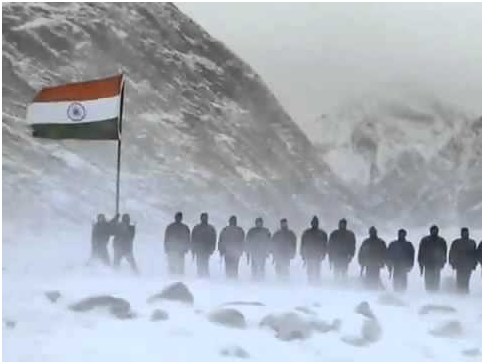No OROP, But No High Altitude Gear, Shoes, Durries For Soldiers Either
Not even the basics?

NEW DELHI: Despite its braggadocio and assurances of ‘ache din’, Prime Minister Narendra Modi’s Hindu nationalist BJP government has failed to deliver even basic gear like high altitude clothing, canvas shoes, mosquito nets, balaclavas and durries to Indian Army jawans.
The Parliamentary Defence Committee, which presented its report to parliament on August 13, savaged the Ministry of Defence (MoD) for failing to provide jawans 217,388 high ankle boots, 130, 092 canvas running shoes and 447,000 balaclavas.
Additional basic equipment deficits in the 1.2 million strong army include 126,270 mosquito nets and 65,978 durries used for sleeping.
Another glaring shortfall is that of 231,141 bulletproof jackets, pending for over six years.
“The Committee recommends that the MoD emerge from its slumber and make the procurement of bulletproof jackets to make up shortages, so as to save lives of thousands of soldiers” the 30-member committee stated in its 67-page report.
The Committee depressingly reiterates enduring shortages, not only of essential kit for jawans, which the BJP administration had promised to make good within its first few months in office, but also of varied weapon systems.
These include howitzers, assault rifles, operationally efficient tanks, assorted missiles and vehicles to carry them, night vision devices and miscellaneous weapon sights.
Committee MP’s expressed concern over the MoD cutting the army’s capital modernisation budget by Rs 15,402.55 crore for FY 2014-15, thwarting all new projects, as the bulk of the financial outlay would be consumed by previously committed liabilities.
This would leave money for little else, for an army whose war waging capability is handicapped by equipment shortages, obsolete hardware and restricted, almost laughable, night-fighting capability. And this is an army that claims it is capable of fighting a two-front war against nuclear rivals Pakistan and China
“The Committee fully understands that (a) capable, motivated and dedicated force cannot move and fight without fuel in its vehicles and fire in its weapons” the report emphasised.
It also recommended that the MoD allocate the army adequate funds to keep its fighting sprits high and the capability to move in any eventuality.
The Committee report merely restates the army’s persistent shortages, including fundamental kit like boots and clothing, which have continued for so long, that they seem almost permanent, unlikely to be made good.
Soldiers admit to equipping themselves by procuring basic gear, especially shoes and warm clothing from the open market with their own money.
Even some of the kit that is supplied to them by Ordnance Factory Board units is of questionable quality and, in most instances, unfit to be used.
Unit langar’s in cantonments around the country abound with complaints centered round sub-standard Government Issue goods provided them and the amounts they have to spend to adequately equip themselves.
Ambitious plans to transform the army from a threat-based force to a capability-based Service by 2020, capable of conducting the entire spectrum of conflict from nuclear war to counter-insurgency operations, continue to be deferred.
A combination of the MoD’s hidebound bureaucracy and an equally lugubrious and inefficient Army headquarters, slow to draw up realistic qualitative requirements (QRs) for varied equipment it badly needs, has contributed to this seemingly intractable impasse.
An earlier 2012 Parliamentary Defence Committee report revealed that as many as 41 of the army’s tenders for diverse equipment, were withdrawn or terminated due to faulty or over ambitious QR’s.
“The arm’s efforts at modernising its combat arms like armoured regiments and the infantry and support arms like the artillery, aviation, air defence, signals and engineering corps were all in shambles, plagued by a lack of timely planning and resource management" former Major General Sheru Thapliyal said.
It needs to seriously kick-start its modernisation plans in order to survive in an increasingly militarised neighbourhood, he stated adding that for that it needed competent leadership.
(Rahul Bedi is a senior journalist, and an expert on defence. He writes for the Janes Defence Weekly)



